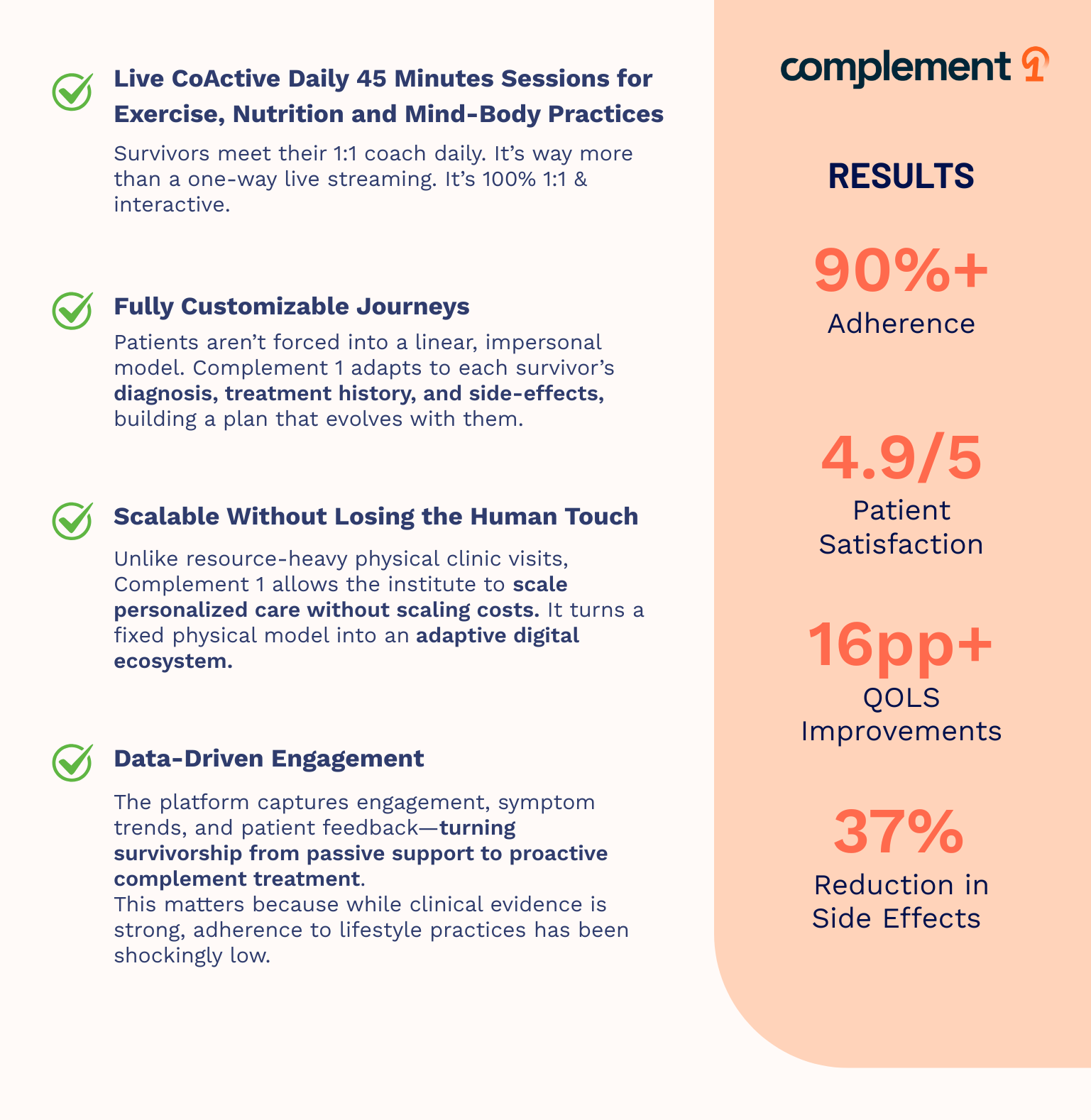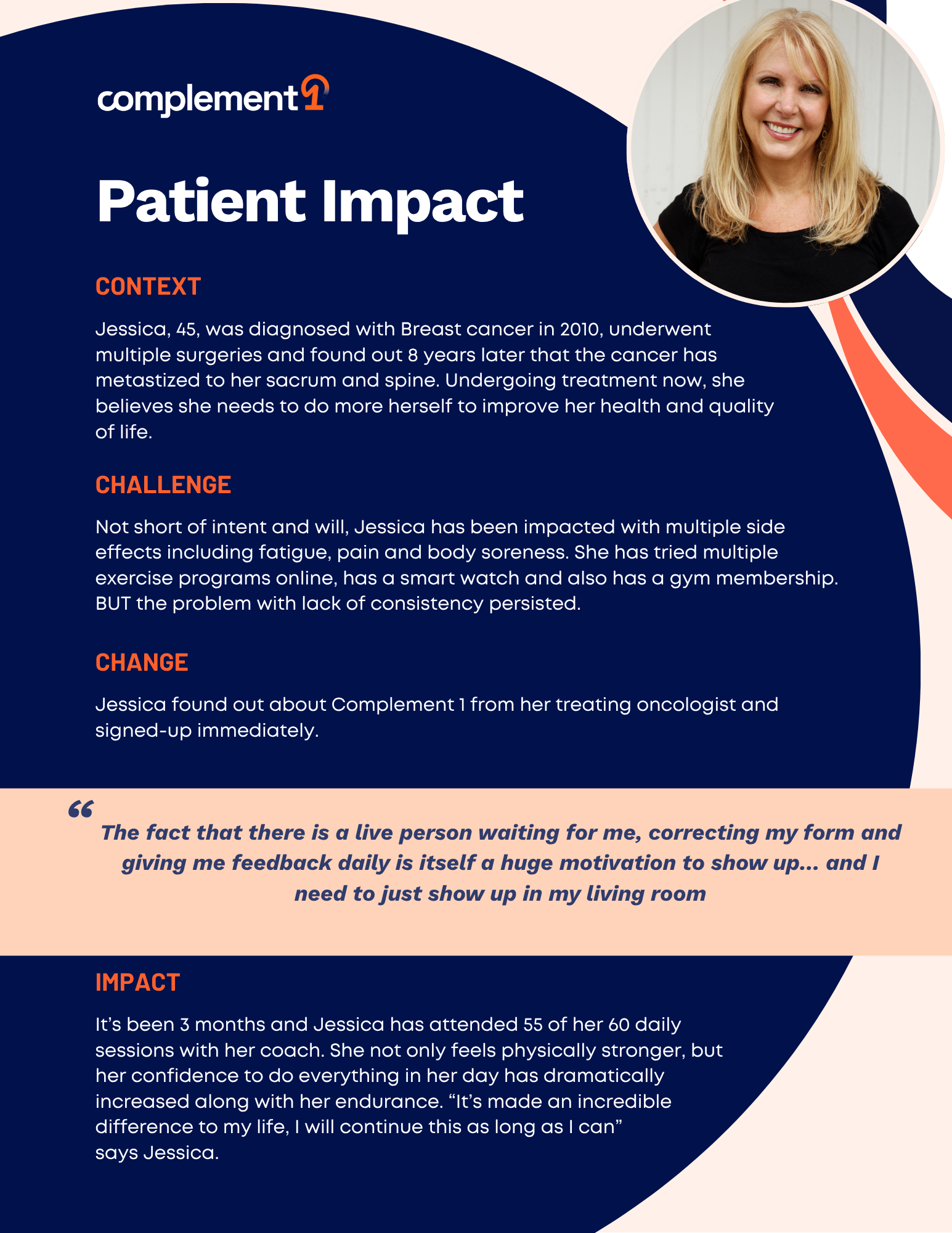Why a top U.S. cancer institute adopted Complement 1.

Summary
A top 3 U.S. cancer center integrated Complement 1 into its survivorship program, setting a precedent on redefining Standard-Of-Care. The decision reflects a deliberate shift towards blending scalable, personalized, and evidence-based lifestyle modifications for cancer survivors, delivered in a model that complements existing survivorship programs.
Enhancing What Works: Survivorship Built for Scale and Engagement
The institute already provided comprehensive survivorship care, including exercise, integrative medicine, nutrition, and psychosocial care. However, known gaps existed in:
- Structured, proactive lifestyle interventions across the survivorship continuum
- Access to remote and underserved populations
- Sustained engagement post-treatment
Complement 1’s daily, human-led lifestyle modification meets the survivors where they are, both physically and emotionally. The fact that the plan is fully customized for each patient based on their cancer type, stage, treatment and side-effects ensures pathbreaking adherence and patient delight, improving their Quality of Life as measured by FACT-G systematically.
“I’ve never been part of anything like this. I show up for my coach daily” said one patient. “I feel emotionally and physically stronger than ever before.”
The Hidden Problem in World-Class Cancer Care
This cancer center already offered what most hospitals dream of: survivorship services, integrative therapies, nutritional guidance, and mental health support. But even at this gold standard of care, three core problems stood in the way of truly patient-centered survivorship:
1. Access is Limited – Many patients live hours away, juggling jobs, finances, or mobility challenges. They couldn’t attend regular in-person survivorship sessions. For rural patients, even the best program is meaningless if it’s out of reach.
2. Programs are Static, Not Live – Survivorship support came in the form of brochures, handouts with guidelines, and one-size-fits-all classes. Patients needed real-time support, not generic advice.
3. Lack of Personalization – Every survivor’s journey is different. Yet the institute’s existing model couldn’t scale care to an individual’s lifestyle, symptom burden, or goals. The result? Many survivors had to wait and eventually dropped out or became disengaged.
The Complement 1 Difference
Evidence-Based Lifestyle That Impacts Cancer Outcomes
That’s where Complement 1 changed the game. It wasn’t just adding a platform, it was a fundamental shift in the approach.
The focus areas, physical movement, nutrition, mind-body practices, are all aligned with global survivorship guidelines. But unlike providing static education resources, Complement 1 is a high-frequency, live, interactive intervention with:

This matters because while clinical evidence is becoming stronger by day, adherence to lifestyle practices has been shockingly low.
Patient Impact

The Opportunity beyond the Obvious
While national guidelines recommend physical activity, stress management, and dietary changes, adherence remains low.
The Data:
- Regular exercise reduces recurrence by 30–50% in breast and colorectal cancers and lowers mortality by up to 40%. (Schmid & Leitzmann, JNCI, 2014; Cormie et al., CA Cancer J Clin, 2017)
- Fewer than 5% of survivors meet recommended activity levels. (Christopher M Blanchard J Clin Oncol et al, 2008)
- Complement 1 sees 90%+ patient adherence at 3 month mark and consistently high satisfaction 4.9/5 in daily live programs.
The institute leveraged Complement 1 to move from education and hoping for patient adoption to high-frequency implementation.
By combining clinical guidelines with daily live coactive coaching, the program helps survivors integrate sustainable changes into daily life. Through micro-goals, symptom tracking, and community accountability, patients become active participants in their recovery.
Conclusion : A Model for the Future of Cancer Care
This top cancer center didn’t adopt Complement 1 out of necessity, they adopted it because they see where oncology is going. Exercise’s impact is no longer limited to supportive care. Survivorship is no longer an afterthought. It is an active phase of care that can determine long-term outcomes, patient trust, and health system performance for value-based programs.

Lifestyle Modification isn’t optional. It’s an important part of the cancer journey, and it deserves the same innovation, attention, and precision as core treatment. Further, with daily live coactive coaches, patients feel seen, supported and empowered.
And perhaps most importantly, they no longer feel left behind once treatment ends.
“Complement 1 allows us to reach further, stay connected longer, and drive measurable improvement in our patients’ lives.” Associate Director of Survivorship, NCI-Designated Cancer Center
This is not a stopgap. It’s a new standard.



